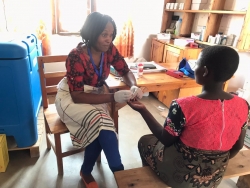
Adequate nutrition is a fundamental cornerstone of any individual’s health, is particularly critical for women because inadequate nutrition wreaks havoc not only on women’s own health but also on the health of their children. Children of malnourished women are more likely to face cognitive impairments, lower resistance to infections, and a higher risk of disease throughout their lives; some face their demise. The 2015-16 Tanzania Demographic and Health Survey (TDHS) reported that, despite a number of global and national efforts made to improve maternal and child services, 45% of women aged 15-49 years, and 57% of pregnant women are anaemic. Currently, 98% of women receive antenatal care from skilled providers and 51% have four or more ANC visits as recommended. Only 21% of women took iron supplements for 90 days or more during their last pregnancy.
The motivation of this study is to establish a baseline understanding of the nutritional status and its associated bottlenecks in IMAN project area. It is important to determine existing gaps in health delivery system for nutrition as well as in nutritional status of women as this information will be used in numerous ways to improve the implementation and measure performance of the IMAN project. The findings and recommendations of this work will be used to assist relevant authorities with the decision towards scale-up of maternal and adolescent nutrition program in Tanzania and inform the development of the maternal nutrition component of the NMNAP II (2021-25) by 2021.
The objective of this survey was to explore nutritional status of pregnant women, access and existing barriers to quality maternal and nutrition health services in Mbeya region. Specifically, this study aimed to: Assess nutritional status of pregnant women attending ANC clinics in Mbeya; Evaluate health facility compliance to national guidelines on provision of maternal and nutritional services; and Determine patient’s and provider’s satisfaction and perception on the current maternal and health services.
